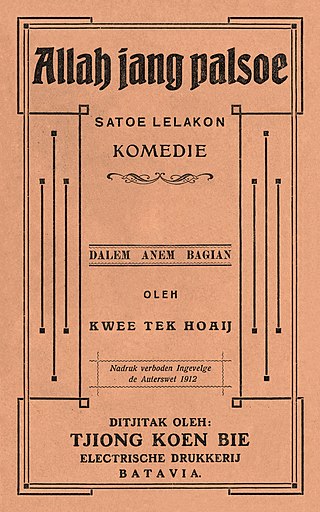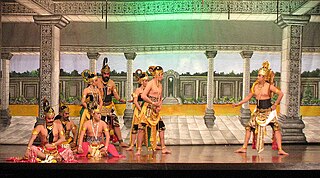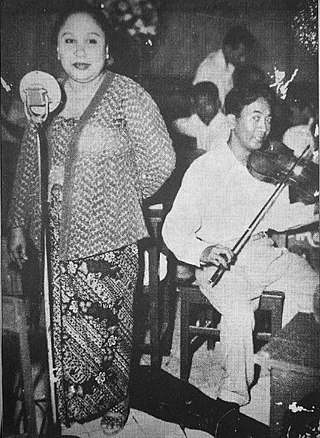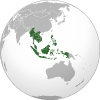
Music of Malaysia is the generic term for music that has been created in various genres in Malaysia. A great variety of genres in Malaysian music reflects the specific cultural groups within multiethnic Malaysian society: Malay, Indonesian, Arabic, Chinese, Indian, Dayak, Kadazan-Dusun, Bajau, Orang Asli, Melanau, Kristang and others.

Indonesia is a country with many different tribes and ethnic groups, and its music is also very diverse, coming in hundreds of different forms and styles. Every region has its own culture and art, and as a result traditional music from area to area also uniquely differs from one another. For example, each traditional type of music is often accompanied by its very own dance and theatre. Contemporary music scene have also been heavily shaped by various foreign influences, such as America, Britain, Japan, Korea, and India.

Bangsawan is a type of traditional Malay opera or theatre performed by a troupe and accompanied by music and sometimes dances. The bangsawan theatrical performance encompasses music, dance, and drama. It is widely spread in the Malay cultural realm in Malaysia, Indonesia, Singapore, and Brunei. The artform is indigenous to the Malay Peninsula, Riau Islands, Sumatra, and coastal Borneo.

Randai is a folk theater tradition of the Minangkabau ethnic group in West Sumatra, Indonesia, which incorporates music, singing, dance, drama and the martial art of silat. Randai is usually performed for traditional ceremonies and festivals, and complex stories may span a number of nights. It is performed as a theatre-in-the-round to achieve an equality and unity between audience members and the performers. Randai performances are a synthesis of alternating martial arts dances, songs, and acted-out scenes. Stories are delivered by both the acting and the singing and are mostly based upon Minangkabau legends and folktales. Randai originated early in the 20th century out of a fusion of local martial arts, story-telling, and other performance traditions. Men originally played both the male and female characters in the story, but since the 1960s, women have also participated.

Kroncong is the name of a ukulele-like instrument and an Indonesian musical style that typically makes use of the kroncong. A kroncong orchestra or ensemble traditionally consists of a flute, a violin, at least one, but usually a pair of kroncongs, a cello in Pizzicato style, string bass in pizzicato style, and a vocalist. Kroncong originated as an adaptation of a Portuguese musical tradition, brought by sailors to Indonesian port cities in the 16th century. By the late 19th century, kroncong reached popular music status throughout the Indonesian archipelago.

The Tong Tong Fair was the largest festival in the world for Indo (European-Indonesian) culture, held annually in the Netherlands. In 2009 it was renamed to 'Tong Tong Fair'. Established in 1959 it was one of the oldest festivals and the fourth largest grand fair in the Netherlands. It was also the annual event with the highest number of paying visitors of the Dutch city of The Hague, having consistently attracted more than 100,000 visitors since 1993.

The Dutch East Indies, also known as the Netherlands East Indies, was a Dutch colony with territory mostly comprising the modern state of Indonesia, which declared independence on 17 August 1945. Following the Indonesian War of Independence, Indonesia and the Netherlands made peace in 1949. In the Anglo-Dutch Treaty of 1824, the Dutch ceded the governorate of Dutch Malacca to Britain, leading to its eventual incorporation into Malacca (state) of modern Malaysia.
Komedi Stambul, spelled Komedie Stamboel during the Dutch colonial era, is a form of trans-ethnic Indonesian folk theatre developed lately, from the 19th-century to the mid-20th century. The theatre originated in the Dutch East Indies.

Abisin Abbas, better known by his pseudonym Andjar Asmara, was a dramatist and filmmaker active in the cinema of the Dutch East Indies. Born in Alahan Panjang, West Sumatra, he first worked as a reporter in Batavia. He became a writer for the Padangsche Opera in Padang, where he developed a new, dialogue-centric style, which later spread throughout the region. After returning to Batavia in 1929, he spent over a year as a theatre and film critic. In 1930 he joined the Dardanella touring troupe as a writer. He went to India in an unsuccessful bid to film his stage play Dr Samsi.

Terang Boelan is a 1937 film from the Dutch East Indies. Written by Saeroen, directed by Albert Balink, and starring Rd Mochtar, Roekiah and Eddie T. Effendi, Terang Boelan follows two lovers who elope after one is almost forced to marry an opium smuggler. The film was shot in the Indies and Singapore, and was partially inspired by the 1936 Hollywood film The Jungle Princess. It was aimed at native audiences and included keroncong music, which was popular at the time, and several actors from Balink's previous work Pareh (1936).

Dardanella was a touring theatre company from the Dutch East Indies established by Willy A. Piedro in 1926. Arising from a background of musical theatre, the troupe focused on realistic stories, both adaptations of foreign works and original stage plays about life in the Indies. Starring Dewi Dja' and Tan Tjeng Bok, the troupe performed original works by Piedro and Andjar Asmara. Popular both in the Indies and abroad, Dardanella dissolved during an international tour after 1936. Several of its members later went into film.

Pembrita Betawi was a daily newspaper from Batavia, Dutch East Indies, which was published from 1884 until 1916. It was established as a joint venture between the Indo journalists J. Kieffer and W. Meulenhoff. The newspaper saw several changes of ownership until rights were acquired by Albrecht in 1887. Notable contributors included Lie Kim Hok and Tirto Adhi Soerjo.

Allah jang Palsoe is a 1919 stage drama from the Dutch East Indies that was written by the ethnic Chinese author Kwee Tek Hoay based on E. Phillips Oppenheim's short story "The False Gods". Over six acts, the Malay-language play follows two brothers, one a devout son who holds firmly to his morals and personal honour, while the other worships money and prioritises personal gain. Over more than a decade, the two learn that money is not the path to happiness.

Miss Riboet's Orion, originally known as the Orion Opera, was a theatrical troupe active in the Dutch East Indies in the 1920s and early 1930s. Established by the husband and wife team Tio Tek Djien and Miss Riboet, the company travelled throughout the Indies and performed various acts, particularly those with action scenes. It was disbanded in 1942, having lost much of its popularity due to competition with Dardanella.

Sandiwara is a genre of traditional theatrical drama of Indonesia. In general, it refers to any kind of drama or theatrical performance, and literally, sandiwara means "to pretend" or "to act". However, the term is often used to describe a genre of traditional drama of West Java. Sandiwara Sunda is a type of sandiwara performed in Sundanese and presenting Sundanese themes, folklores and stories. It is quite similar to Javanese ketoprak or wayang orang.

Lauw Giok Lan was a Chinese Indonesian journalist and writer. He was one of the founders of the newspaper Sin Po.

It is quite difficult to define Indonesian art, since the country is immensely diverse. The sprawling archipelago nation consists of 17,000 islands. Around 922 of those permanently inhabited, by over 1,300 ethnic groups, which speak more than 700 living languages.

Catharina Felicia van Rees was an author, editor, and composer. She wrote novels about the lives of composers and edited a collection of "Dutch Authoresses" to use the language of the time. She wrote her novels under the pseudonym Celéstine. She favored the education of Dutch women and for women to show their talents "into the light and let it shine forth." That stated the Dutch aspect of this was important to her as well and she was willing to include male writers if not enough Dutch women writers were available. She is also of some interest in the History of South Africa as she wrote the National anthem of the Transvaal.

Indonesian theatre is a type of art in the form of drama performances that are staged on a stage, with a distinct Indonesian nuance or background. In general, theatre is an art that emphasizes the performing arts that are displayed in front of a large crowd. In other words, theater is a form of visualisation of a drama that is staged on the stage and watched by the audience. Indonesian theatre includes the performing arts of traditional theater and modern theatre located in the territory of Indonesia. Some examples of Indonesian theater are Arja, Wayang, Wayang wong, Lenong, Ludruk, Janger, Randai and others. Theatre in Indonesia can also be referred to as regional or ethnic theatre, because it originates and develops from 1,300 ethnic cultures in Indonesia.

Raden Ajeng Srimulat, also known simply as Srimulat, was an Indonesian comedian, actor, singer, and founding member of the popular Srimulat comedy troupe. She was the wife of Teguh Slamet Rahardjo, one of the most famous Indonesian comedians of the postwar era.





















